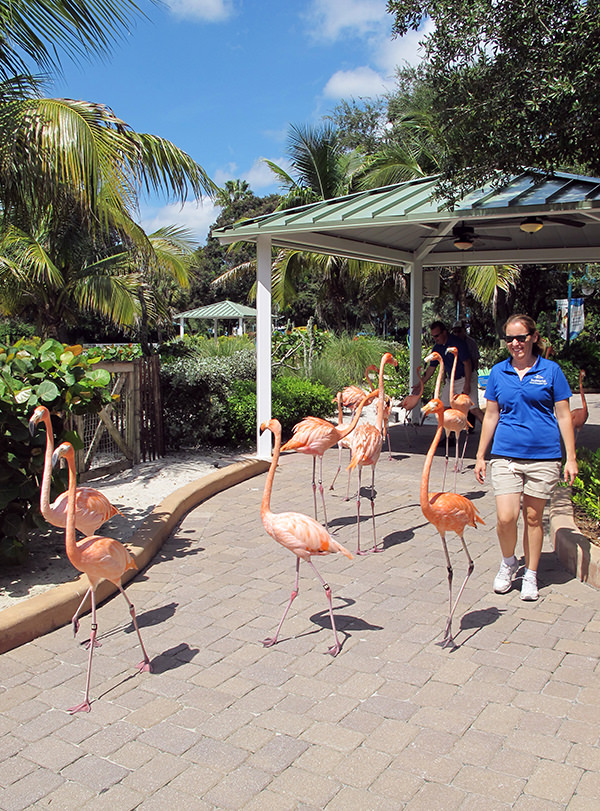Aviculture Department
Aviculture literally means "the culture of birds," or the care, housing, and feeding of birds. Aviculturists feed, monitor the health, and clean the exhibits of a park's bird collection, from penguins to macaws, ostriches to hummingbirds. They also often raise young hatchlings, a task requiring enormous amounts of time since most chicks must be fed regularly and frequently. During peak hatching times, some zoological institutions hire temporary seasonal help to assist the aviculture staff in caring for the newcomers as well as the existing collection.

Positions
Curator of birds
Main job duties:
Responsible for the long-range management of the department, the Curator of Birds also manages the overall daily operations. Regular communication with the aviculture staff is essential, and keeps the curator current regarding the state of health of all the birds in the collection. The curator also monitors dietary habits of the birds, and works to develop new diets. Aiming to balance the collection throughout the park to maximize reproduction, aviculture curators use their in-depth knowledge of birds to develop and manage breeding programs. In addition to maintaining studbooks for their zoological institution, they frequently work with other curators from across the country to participate Species Survival Plans are for the long-term propagation of species. Curators also help develop new animal exhibits and work with contractors during the construction process.
Education:
Bachelor's degree or equivalent in biological sciences.
Initial training:
Ten years experience, seven of which are at a managerial level, are required.
Works closely with:
Aviculture Supervisor, other animal departments, Horticulture department, Maintenance department, Education department, Graphics department, Water Quality department, Design and Engineering department, veterinary staff.
Challenges:
Long hours are required to accomplish all the things a curator does. He or she is often required to travel on short notice and for extended periods to meet with other zoological professionals, and when transferring animals from one park to another.

Supervisor of aviculture
Main job duties:
Supervisors of this department oversee daily operations, train new personnel, and schedule staff. The Aviculture Supervisor is primarily responsible for current record maintenance as well as the direction of animal transports. The supervisor often participates in various education programs.
Education:
Associate's or Bachelor's degree or the equivalent in biological sciences; in some cases, scuba certification.
Initial training:
A minimum of two years experience in aviculture is required.
Works closely with:
Curator, aviculturists, other animal departments, Education department, Water Quality department, Horticulture department, Payroll department.
Challenges:
A supervisor must manage and direct personnel so that animals receive proper care. Some species, such as macaws, often destroy their exhibits if proper plantings and exhibit construction are not suitable. The supervisor is responsible for assuring that all exhibits are maintained properly for the health and well-being of the birds.

Aviculturist
Main job duties:
The aviculturist plays a key role in this department's daily operations, including the daily diet preparation and distribution to all the birds in the collection. A large part of an Aviculturist's day is spent cleaning and maintaining exhibits, observing bird behavior, and maintaining records.
Education:
Associate's or Bachelor's degree; in some cases, scuba certification.
Initial training:
Experience working with animals such as in a veterinary hospital, animal shelter, pet store, or ranch is essential.
Works closely with:
Other animal services departments, veterinary staff, laboratory staff, Water Quality department, and Education department.
Challenges:
Cleaning and feeding is very physical work, and is especially difficult around unpleasant odors. Aviculturists may be needed for 24-hour care of hatchlings, or critically injured birds (such as pelicans and cranes).




